

Lady Macduff. Historical Background to Macbeth. Elizabethan England. Queen Elizabeth 1. The first Queen Elizabeth, whose name has become a synonym for the era which she dominated (1558-1603), was born in 1533 to Henry VIII and Anne Boleyn.
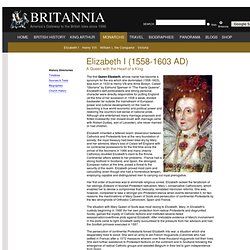
Called "Gloriana" by Edmund Spenser in "The Faerie Queene", Elizabeth's deft politicalskills and strong personal character were directly responsible for putting England (at the time of her accession in 1558 a weak, divided backwater far outside the mainstream of European power and cultural development) on the road to becoming a true world economic and political power and restoring the country's lost sense of national pride. Although she entertained many marriage proposals and flirted incessantly (her closest brush with marriage came with Robert Dudley, earl of Leicester), she never married or had children. Her first order of business was to eliminate religious unrest. The situation with Mary Queen of Scots was most vexing to Elizabeth. As they say, the rest is history. Elizabeth was a master of political science. Life in Elizabethan England. Written and edited by Maggie Secara 11th Edition Spring 2011 Newly expanded incorporating all previous editions & appendices Designed for the World Wide Web by Paula Kate Marmor.
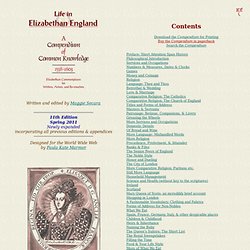
Elizabeth I: An Overview (BBC) Elizabethan World Order. Elizabethan World Order This theory, based on the Greek philosopher Aristotle’s concept of the universe, was of great importance to Shakespeare’s contemporaries and was used by him in developing events in his plays.
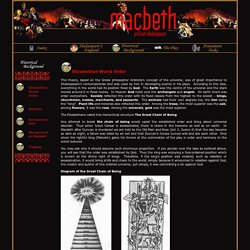
According to this idea, everything in the world had its position fixed by God. Motifs and Symbols. Nature. Macbeth: Nature and the Unnatural. Nature and the Unnatural The witches show us what the unnatural looks like.
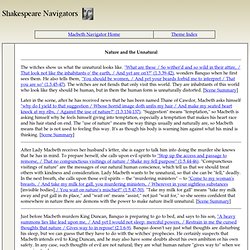
"What are these / So wither'd and so wild in their attire, / That look not like the inhabitants o' the earth, / And yet are on't? " (1.3.39-42), wonders Banquo when he first sees them. He also tells them, "You should be women, / And yet your beards forbid me to interpret / That you are so" (1.3.45-47). The witches are not fiends that only visit this world. Later in the scene, after he has received news that he has been named Thane of Cawdor, Macbeth asks himself "why do I yield to that suggestion / Whose horrid image doth unfix my hair / And make my seated heart knock at my ribs, / Against the use of nature?
" After Lady Macbeth receives her husband's letter, she is eager to talk him into doing the murder she knows that he has in mind. Macbeth: Birds. Birds The Sergeant tells King Duncan how, just at the moment when Macbeth's forces defeated Macdonwald's rebels, the Norwegian king attacked the Scots.
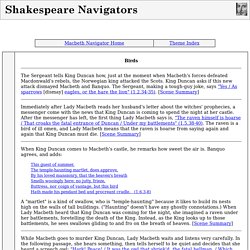
King Duncan asks if this new attack dismayed Macbeth and Banquo. Macbeth: Sleep. Sleep On the night that Macbeth murders King Duncan, Banquo says to his son, "A heavy summons lies like lead upon me, / And yet I would not sleep: merciful powers, / Restrain in me the cursed thoughts that nature / Gives way to in repose!
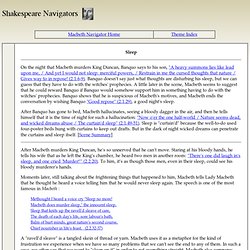
(2.1.6-9). Banquo doesn't say just what thoughts are disturbing his sleep, but we can guess that they have to do with the witches' prophecies. A little later in the scene, Macbeth seems to suggest that he could reward Banquo if Banquo would somehow support him in something having to do with the witches' prophecies. Macbeth: Blood. Blood "What bloody man is that?
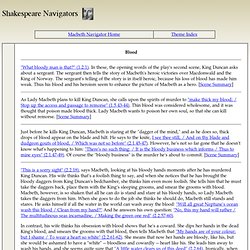
" (1.2.1). In these, the opening words of the play's second scene, King Duncan asks about a sergeant. The sergeant then tells the story of Macbeth's heroic victories over Macdonwald and the King of Norway. The sergeant's telling of the story is in itself heroic, because his loss of blood has made him weak. As Lady Macbeth plans to kill King Duncan, she calls upon the spirits of murder to "make thick my blood; / Stop up the access and passage to remorse" (1.5.43-44). Just before he kills King Duncan, Macbeth is staring at the "dagger of the mind," and as he does so, thick drops of blood appear on the blade and hilt.
"This is a sorry sight" (2.2.18), says Macbeth, looking at his bloody hands moments after he has murdered King Duncan. In contrast, his wife thinks his obsession with blood shows that he's a coward. Moments later, Macduff enters and Ross asks him, "Is't known who did this more than bloody deed? " Macbeth: Hands. Hands The Sergeant, with grim humor, tells how Macbeth did not offer the hand of friendship to the rebel Macdonwald.
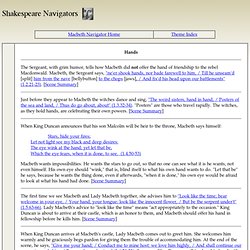
Macbeth, the Sergeant says, "ne'er shook hands, nor bade farewell to him, / Till he unseam'd [split] him from the nave [bellybutton] to the chops [jaws], / And fix'd his head upon our battlements" (1.2.21-23). [Scene Summary] Just before they appear to Macbeth the witches dance and sing, "The weird sisters, hand in hand, / Posters of the sea and land, / Thus do go about, about" (1.3.32-34). "Posters" are those who travel rapidly. When King Duncan announces that his son Malcolm will be heir to the throne, Macbeth says himself: Stars, hide your fires;Let not light see my black and deep desires:The eye wink at the hand; yet let that be,Which the eye fears, when it is done, to see. (1.4.50-53) Macbeth wants impossibilities. King Duncan. Lady Macbeth. Impetus. Macbeth. Tragic Hero. Ambition (full article available on Facts on File) Banquo.
Witches. Macbeth: Witches and Witchcraft. Macbeth and the Witches. By Jennifer Riedel.
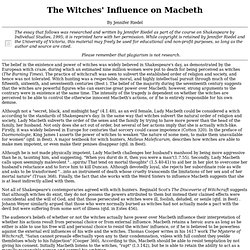
BBC Video Clip: Role of the Witches. Macduff. Lady Macduff.